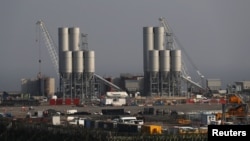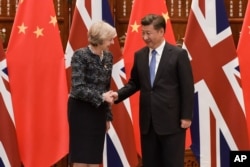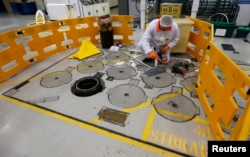There's a whole lot more in British Prime Minister Theresa May's decision to allow a Chinese company to invest in the Hinkley Point C nuclear plant than mere business.
Chinese investment is limited to investing funds in the $24 billion project, which will use two French reactors supplied by Electricity de France. But the project could clear the way for Chinese involvement in a more crucial project at Bradwell, east England, which would allow China to export its nuclear technology to the Western world, analysts say.
China General Nuclear Corporation, the investor in Hinkley Point, already has signed a pre-feasibility agreement for the Bradwell project.
"Hinkley Point C is completely based on French design. It is the Bradwell project that is very important to the Chinese because they might get the opportunity to apply their own technology," Jan Gaspers, head of research for the European China Policy unit at Berlin's Mercator Institute for China Studies, told VOA.
Only a few developing countries like Pakistan are using Chinese reactors. These countries are not known to have the kind of strict regulatory control seen in the West.
The Bradwell B project could be a game changer. Getting regulatory approval in Britain for its reactors is crucial for China because it can open the doors for Chinese nuclear exports to the West.
Hold and release
One of May's first acts after taking over as prime minister last July was to halt the $24 billion Hinkley Point project in order to review the security risks involved in the project, which was to be owned jointly by Electricity de France, or EDF, and China General Nuclear Corporation. Within weeks, she reversed the decision after meeting with Chinese President Xi Jinping on the sidelines of the Group of 20 nations meeting in Hangzhou. The British government inserted some safety clauses in the contract to ensure that the Chinese company does not gain majority stake, in the event of the EDF pulling out.
But there's many a slip between May's lip and China's cup of hope. Britain already is in the midst of fierce debate with critics voicing concern about security issues. Critics question a provision in the contract that provides for a fixed electricity rate for 35 years at a time when energy prices are falling, and are expected to be much lower in the future.
Among the British prime minister's close advisers is Nick Timothy, joint Downing Street chief of staff, who earlier worked with May as her adviser in the Home Office. Timothy is known for his extremely critical views on China, which he earlier described as a "hostile state."
Security fears
"It is believed that the deals could lead to the Chinese designing and constructing a third nuclear reactor at Bradwell in Essex. Security experts reported to be inside as well as outside government are worried that the Chinese could use their role to build weaknesses into computer systems that will allow them to shut down Britain's energy production at will," Timothy wrote in an article published in October 2015.
Timothy also said that MI5, the British spy agency, believes that China works "against U.K. interests at home and abroad." He also was critical of Chinese investments in Britain. "But no amount of trade and investment should justify allowing a hostile state easy access to the country's critical national infrastructure," he said.
Analysts believe May was seeking Chinese investments because of the urgent need to fill Britain's energy gap, as well as move away from polluting coal-based electricity production. But Britain's security is of critical importance to her.
"I think May would make no compromises on the issue of security. She is going to be extremely alert about any increase in Chinese influence in the British nuclear industry," Gaspers said. "There is not much security risk from the technology angle because the Chinese don't own it. The only risk is about the Chinese gaining majority control over Hinkley Point in [the] future."
Image booster
For Beijing, British approval for the Hinkley Point project is a major image booster, analysts say. Chinese business is seen in the West as an acquirer of property and trader of low-tech, unbranded goods, they point out.
"A major Western country accepts to have Chinese involvement on its own territory in a highly strategic industry. This is a highly significant form of cooperation," said David Gosset, founder of the Euro-China Forum and director of the Academia Sinica Europaea at China Europe International Business School. "We are now witnessing the constitution of a new China-EU-U.K. triangle. It is a slow and complex process, but it will be defining the future of the relations between China and Europe."






